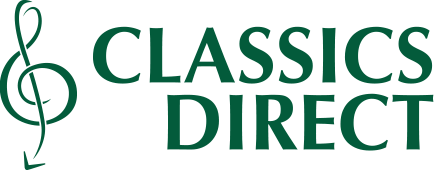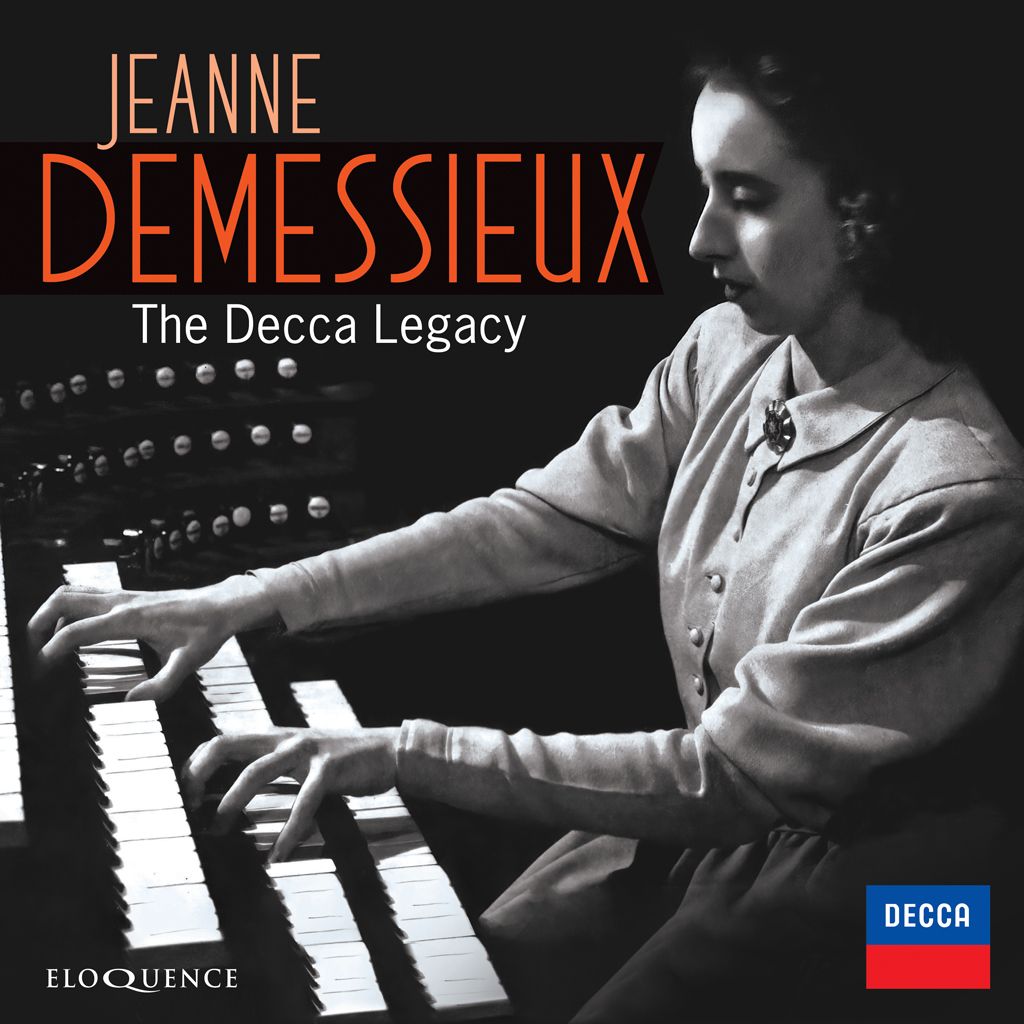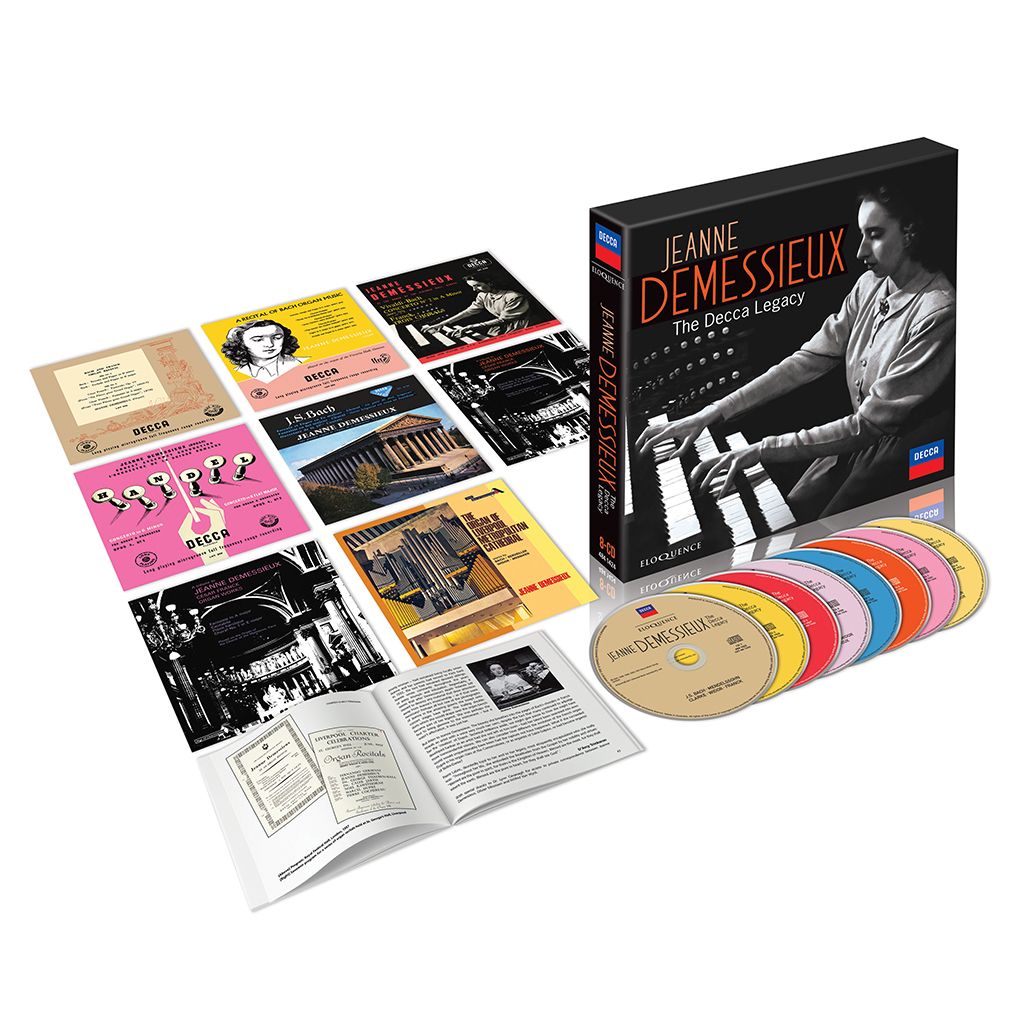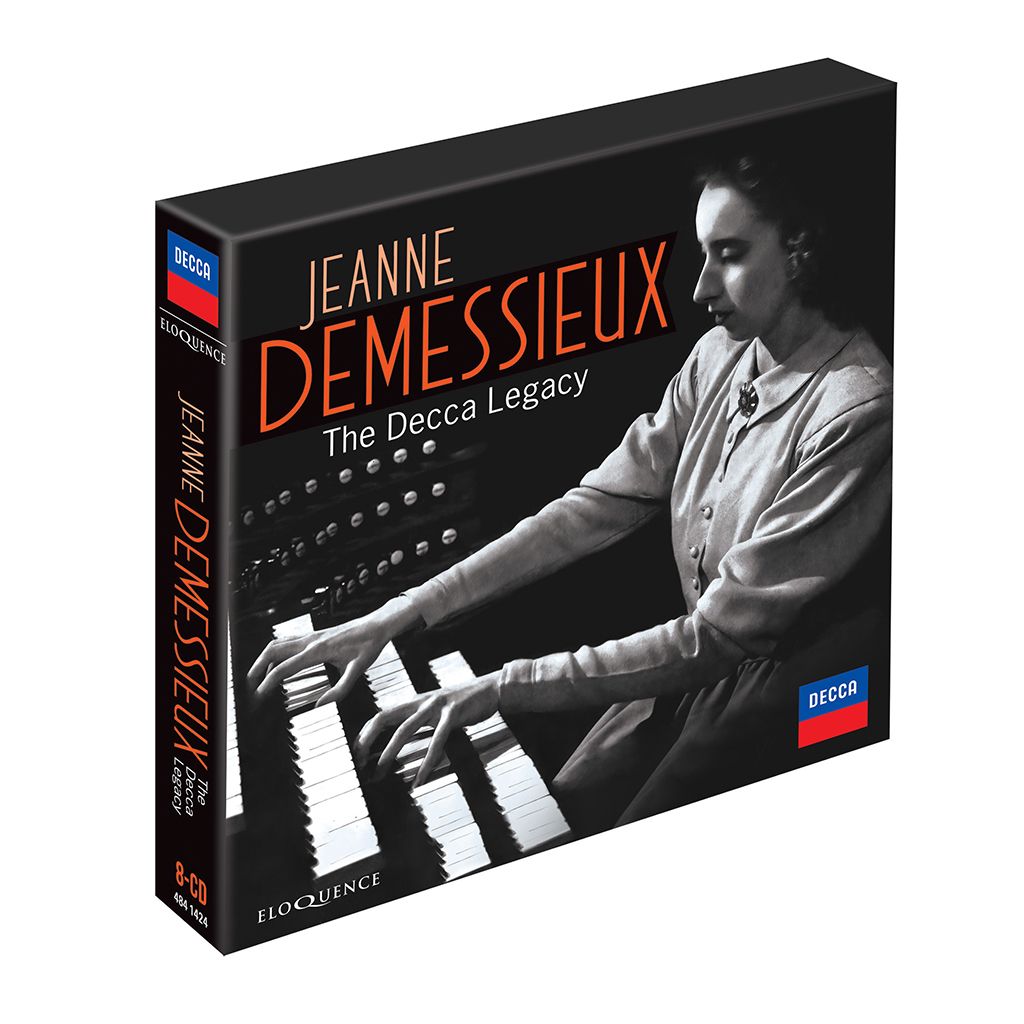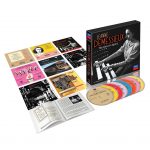From her legendary debut through the succeeding years, Jeanne Demessieux brought virtuosity allied to intellect and sensitivity, and went on to become the glory of the French organ school. This 8-CD celebration of one of the instrument’s most spoken-of, yet enigmatic figures, brings together for the first time her complete Decca recordings and a previously unpublished BBC Radio broadcast, and is released to mark the centenary of her birth.
It includes Demessieux’s legendary Franck recordings; her recordings from St. Mark’s, North Audley Street, London, many released for the first time since the original 78s; little-known recordings of sacred songs with Demessieux accompanying the Belgian soprano, Suzanne Danco; and an improvisation on a submitted theme from the only extant BBC radio broadcast with Demessieux, which also includes Bach, Buxtehude, Widor and Messiaen.
All recordings have been carefully remastered by Mark Obert-Thorn and Chris Bernauer.
The accompanying booklet includes details of Demessieux’s unpublished recordings, rare photos and facsimiles of some of her programs, extensive notes, including details of some of the recording sessions; and notes on the instruments and full specifications for each of the five organs.
– – –
ON JEANNE DEMESSIEUX (1921–1968)
“Jeanne Demessieux is the greatest organist of all generations” – MARCEL DUPRÉ
Demessieux’s relationship with Decca began in May 1947, just a year after her legendary Paris debut, and this collection of all her commercial recordings spans the whole of her public career. She was one of the first women to achieve stardom in the world of the organ – a dimly-lit, often cloistered demi-monde dominated by men throughout its history. Now, a hundred years after her birth, she remains one of the instrument’s most spoken-of, yet enigmatic, figures. Few organists have ever achieved such fame. In the middle of the twentieth century she was one of the world’s most famous instrumentalists, the undisputed doyenne of organists.
Jeanne Marie-Madeleine Demessieux was born in the provincial city of Montpellier on 13 February 1921 and in her all too brief life rose to become the glory of the French organ school. Virtuoso organist-composer-improviser hors de pair in the great French virtuoso tradition, after studies with Lazare Lévy, Léila Gousseau, Magda Tagliaferro and Noël Gallon, Demessieux became heir to the great French organ tradition imbibed from her ‘maître’ Marcel Dupré. As a performer, she was without equal; as an artist, she breathed life into the repertoire, and transfigured every piece she played, revealing works anew through her intellect, ingenuity and sensitivity. As a composer, she enlarged the technical possibilities and expanded the expressive dimensions of the organ literature. And as a teacher, her pupils included the remarkable names of Marie-Madeleine Duruflé, Louis Thiry and Pierre Labric. Poulenc, Messiaen and Langlais were among her most fervent admirers.
Demessieux’s life was one of both struggle and glory. Having fought – and for the most part, overcome – intransigent modes of thinking about gender, imbroglios in the highly-politicized organ world, and fragile health, Demessieux left us almost as suddenly as her radiance was revealed – her premature death seizing from us witness to any more of her transcendental visions. Yet wherever she played, ‘in all her most glorious triumphs Jeanne Demessieux never departed from the natural simplicity which gave her so much charm. The glory gave her an aura without affecting her. The international press, much more than in France, admired her without any reserve and discovered in her an exceptional person, who was already a legend in her own lifetime”, wrote her pupil Pierre Labric.
‘In the world of the arts, a fairy tale evokes either annoyance or delight. But one must believe it, when the unique and prodigious character happens to be a young lady, 25 years of age, who from the very first moment of her public appearance manifested herself as the irresistible absolute perfection.’ – LE FIGARO
‘You have before you a very great artist, a magnificent mind, a star of the organ, capable of succeeding me. She will be – I’m sure of this – one of the greatest glories of France.’ – MARCEL DUPRÉ
‘Next to Jeanne Demessieux we all play the pedals like elephants!’ – MAURICE DURUFLÉ
CD 1
JOHANN SEBASTIAN BACH (1685–1750)
Toccata and Fugue in D minor, BWV 565 (Rec. 1947)
FELIX MENDELSSOHN (1809–1847)
Sonata in A major, Op. 65 No. 3 – Maestoso
JEREMIAH CLARKE (1674–1707)
Trumpet Tune (formally attrib. Henry Purcell / Trans. Marcel Dupré)
CHARLES-MARIE WIDOR (1844–1937)
Toccata (Symphonie V, Op. 42 No. 1)
CÉSAR FRANCK (1822–1890)
Cantabile (Trois Pièces)
Pastorale (Six Pièces)
Fantaisie (Trois Pièces)
JOHANN SEBASTIAN BACH (1685–1750)
Prelude and Fugue in D major, BWV 532
Toccata and Fugue in D minor, BWV 565 (Rec. 1951)
Jeanne Demessieux at the organ of St. Mark’s, North Audley Street, London
CD 2
JOHANN SEBASTIAN BACH (1685–1750)
Toccata, Adagio and Fugue in C major, BWV 564
Prelude and Fugue in A minor, BWV 543
Chorale Prelude: Wenn wir in höchsten Nöten sein, BWV 641 (from Orgelbüchlein)
Chorale Prelude: Nun komm’ der Heiden Heiland, BWV 659 (from 18 Chorale Preludes)
Chorale Prelude: Jesus Christus, unser Heiland, BWV 688 (from Clavierübung III)
Fugue in G major (à la gigue), BWV 577
Toccata and Fugue in D minor, BWV 565
Fantasia and Fugue in G minor, BWV 542
Concerto in A minor, BWV 593 (Based on Vivaldi’s Concerto in A minor, Op. 3 No. 8, RV 522)
Jeanne Demessieux at the organ of Victoria Hall, Geneva
CD 3
CÉSAR FRANCK (1822–1890)
Trois Chorals
FRANZ LISZT (1811–1886)
Fantasia and Fugue on ‘Ad nos, as salutarem undam’
CHARLES-MARIE WIDOR (1844–1937)
Variations (Symphonie gothique, Op. 70)
Jeanne Demessieux at the organ of Victoria Hall, Geneva
CD 4
GEORGE FRIDERIC HANDEL (1685–1759)
Organ Concerto in G minor, Op. 4 No. 1, HWV 289
Organ Concerto in B flat major, Op. 4 No. 2, HWV 290
Jeanne Demessieux at the organ of Victoria Hall, Geneva
L’Orchestre de la Suisse Romande
Ernest Ansermet
HEINRICH SCHÜTZ (1585–1672)
Eile mich, Gott, zu erretten, SWV 282
JOHANN SEBASTIAN BACH (1685–1750)
Bist du bei mir, BWV 508
Komm, süßer Tod, komm, selge Ruh’, BWV 478
Warum betrübst du dich, BWV 516
Suzanne Danco, soprano
Jeanne Demessieux at the organ of Victoria Hall, Geneva
FRANZ LISZT (1811–1886)
Prelude and Fugue on B.A.C.H
CHARLES-MARIE WIDOR (1844–1937)
Allegro (Symphony No. 6, Op. 42 No. 2)
ÉDOUARD MIGNAN (1884–1969)
Toccata médiévale
JEAN BERVEILLER (1904–1976)
Mouvement
JEANNE DEMESSIEUX (1921–1968)
Te Deum, Op. 11
Jeanne Demessieux at the organ of La Madeleine, Paris
CD 5
JOHANN SEBASTIAN BACH (1685–1750)
Choral Prelude: O Mensch, bewein’ dein’ Sünde groß, BWV 622 (from Orgelbüchlein)
Chorale Prelude: Christ unser Herr zum Jordan kam, BWV 684 (from Clavierübung III)
Fantasia in G major, BWV 572
Sinfonia from Cantata No. 29, BWV 29 (Trans: Marcel Dupré)
Chorale-Prelude: Erbarm’ dich mein, o Herre Gott, BWV 721
Toccata and Fugue in F major, BWV 540
WOLFGANG AMADEUS MOZART (1756–1791)
Adagio and Fugue in C minor, KV 546 / 426 (Adagio: transc. Demessieux; Fugue: transc. Dupré)
Fantasia in F minor, KV 608
Jeanne Demessieux at the organ of La Madeleine, Paris
CD 6
CÉSAR FRANCK (1822–1890)
Six Pièces
Jeanne Demessieux at the organ of La Madeleine, Paris
CD 7
CÉSAR FRANCK (1822–1890)
Trois Pièces
Trois Chorals
Jeanne Demessieux at the organ of La Madeleine, Paris
CD 8
OLIVIER MESSIAEN (1908–1992)
Transports de joie d’une âme devant la gloire du Christ qui est la sienne (L’Ascension)
JOHANN SEBASTIAN BACH (1685–1750)
Choral Prelude: Liebster Jesu, wir sind hier, BWV 731
JEAN BERVEILLER (1904–1976)
Mouvement
CHARLES-MARIE WIDOR (1844–1937)
Toccata (Symphonie V, Op. 42 No. 1)
Jeanne Demessieux at the organ of Liverpool Metropolitan Cathedral
Live Recording from the BBC – Previously Unpublished
DIETERICH BUXTEHUDE (1637–1707)
Fugue in C major, BuxWV 174
JOHANN SEBASTIAN BACH (1685–1750)
Choral Prelude: Liebster Jesu, wir sind hier, BWV 731
CHARLES-MARIE WIDOR (1844–1937)
Allegro vivace (Symphonie V, Op. 42 No. 1)
JEANNE DEMESSIEUX (1921–1968)
Improvisation on a theme submitted by Adrian Beaumont
Jeanne Demessieux at the organ of Colston Hall, Bristol
Please note: CD 8 is released in physical format only and is not available on digital services.
CD 1
Recording Producers: Terence Gibbs (Bach: BWV 565 – 1947 recording, Mendelssohn); Victor Olof (Clarke, Widor); John Culshaw (Franck: Pastorale, Fantaisie; Bach: BWV 532, BWV 565 – 1950 recording); unknown (Franck: Cantabile)
Balance Engineer: Kenneth Wilkinson (Mendelssohn, Clarke, Widor); unknown (Bach, Franck)
Recording Location: St. Mark’s, North Audley Street, London, UK, 6 May (Bach: BWV 565 – tracks 1, 2), 7 May (Mendelssohn, Clarke), 31 October 1947 (Widor), 30 April 1949 (Franck: Cantabile), 19 October (Franck: Pastorale, Bach: BWV 532, BWV 565 – 1950 recording), 20 October 1950 (Franck: Fantaisie)
Original Decca Releases: K1635 (Bach: BWV 565 – 1947 recording): October 1947; K1700 (Mendelssohn): March 1949; K1914 (Clarke): August 1948; K1914 (Widor): August 1948; K2360 (Franck: Cantabile): June 1950; LXT 2578 (Franck: Pastorale, Fantaisie; Bach: BWV 532, BWV 565 – 1950 recording): May 1951
Audio Restoration Engineer: Mark Obert-Thorn (Bach: BWV 565 – 1947 recording, Mendelssohn, Clarke, Widor, Franck: Cantabile)
CD 2
Recording Producer: Victor Olof
Balance Engineer: Gil Went
Recording Location: Victoria Hall, Geneva, Switzerland, October 1953 (Bach: BWV 564, 543, 641, 659, 688, 577, 565, 542), 5–6 May 1955 (Bach: BWV 593)
Original Decca Releases: LXT 2915 (Bach: BWV 564, 543, 641, 659, 688, 577): April 1954; LW 5095 (Bach: BWV 565, 542): March 1954; LXT 5185 (Bach: BWV 593): November 1956
CD 3
Recording Producer: Victor Olof
Balance Engineers: Gil Went (Franck); Arthur Haddy (Liszt, Widor)
Recording Location: Victoria Hall, Geneva, Switzerland, 5–6 May 1955 (Franck), October 1952 (Liszt, Widor)
Original Decca Releases: LXT 5185: November 1956 (Franck); LXT 2773: February 1953 (Liszt, Widor)
CD 4
Recording Producers: Victor Olof (Handel, Schütz, Bach); unknown (Liszt, Widor, Mignan, Berveiller, Demessieux)
Balance Engineers: Arthur Haddy (Handel, Schütz, Bach); unknown (Liszt, Widor, Mignan, Berveiller, Demessieux)
Recording Locations: Victoria Hall, Geneva, Switzerland, October 1952 (Handel, Schütz, Bach); Église de la Madeleine, Paris, France, July 1958 (Liszt, Widor, Mignan, Berveillier, Demessieux)
Original Releases: Decca LXT 2759 (Handel): January 1953; Decca LX 3113 (Schütz, Bach): July 1953; Decca France (Liszt, Widor, Mignan, Berveiller, Demessieux)
CD 5
Recording Producers: unknown
Balance Engineers: unknown
Recording Location: Église de la Madeleine, Paris, France, 1958
Original Releases: Decca CEP 500000 (Bach: BWV 622); Decca France 173.866 (Bach: BWV 684, 572, 29, 721, 540); Decca France 173.867 (Mozart)
Transfers and Audio Restoration: Giulio Rusconi (Bach: BWV 684, 572)
CD 6
Recording Producers: unknown
Balance Engineers: unknown
Recording Location: Église de la Madeleine, Paris, France, July 1959
Original Decca Releases: Decca France FAT 173914–17: 1960. Also released in the UK on SDD 203 (Fantaisie, Grande pièce symphonique) and SDD 204 (Prélude, Fugue et Variation, Pastorale, Prière, Final): September 1969
CD 7
Recording Producers: unknown
Balance Engineers: unknown
Recording Location: Église de la Madeleine, Paris, July 1959
Original Decca Releases: Decca France FAT 173914–17: 1960. Also released in the UK on SDD 202 (Fantaisie, Cantabile, Pièce héroïque, Choral No. 1), SDD 203 (Choral No. 2) and SDD 204 (Choral No. 3): September 1969
CD 8
MESSIAEN, BACH, BERVEILLER, WIDOR
Recording Producer: Norman Austin
Balance Engineer: John Timperley
Recording Location: Liverpool Metropolitan Cathedral, Liverpool, UK, 1967
Original Decca Release: SDD 236: 1970
BBC RADIO BROADCAST – BUXTEHUDE, BACH, WIDOR, MESSIAEN, DEMESSIEUX
Recording Producer: unknown
Recording Engineer: unknown
Recording Location: Colston Hall, Bristol, UK, 1967
Original BBC Radio Broadcast: 7 September 1967
“This young French player has an amazing technique and uses a considerable variety of touch” Gramophone, October 1947 (Bach, BWV 565 – 1947 recording)
“This really is that very rare thing, organ playing with imagination … Without pretending to authority, I feel that I had stepped into Westminster Abbey in Purcell’s time I might have heard organ playing which sounded like this” Gramophone, September 1948 (Clarke, attr. Purcell)
“… a deep dream of peace to soothe a tortured world … Miss Demessieux gives a most restrained and finely-phrased performance” Gramophone, August 1950 (Franck: Cantabile – 1949 recording)
“a wonderful piece of engineering, as faithful a reproduction of organ sound as I have ever heard” Gramophone, June 1954 (Bach: LW 5095)
“Jeanne Demessieux gives a nobly authoritative performance [of Messiaen’s Transports de joie]. Then, in complete contrast, comes an exquisite treatment of the Bach chorale prelude, Liebster Jesu, wir sind her on some luscious soft stops.” Gramophone, January 1968 (Organ of Liverpool Metropolitan Cathedral)
“Demessieux’s performance of these Franck works is as authoritative as anything we are likely to hear” Gramophone, September 1969 (Franck Organ works – 1959 recordings)



